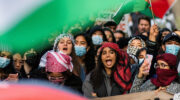Boston Marathon is a hot one, but is it the hottest marathon ever?
Temperatures soared Monday during the 116th Boston Marathon. About 16 percent of registered runners didn’t compete in this year’s race, even as wheelchair athlete Josh Cassidy set a new world record. Kenyan runners took the top three spots in today’s race.
| View caption Hide caption
|
Expectations that competitors in Monday’s Boston Marathon will be out on the road in temperatures as high as 88 degrees F. prompt the question: Is this the hottest marathon ever?
Many long-distance races are scheduled at times of the year when the weather is typically mild, to avoid extreme conditions for athletes. But there have been past marathons in the US when the mercury has risen nearly as high and even higher.
The two biggest marathons in the US, in New York and Chicago, have both held races in years when temperatures or humidity spiked. Boston, moreover, appears to be the record-holder for high-temp runs in a major marathon: In 1905 (this year marks the 116th running of the Boston Marathon), the mercury reached 100 degrees.
The Boston Athletic Association, the marathon organizer, allowed competitors to opt out of the race because of the heat and defer until next year. About 16 percent (or 4,290 registered runners) decided against competing Monday, the BAA said.
Race organizers recommended late last week that “only the fittest runners should consider participating” in the 26.2-mile course, and, in only the second time since the event began, gave registrants the opportunity to defer participation until 2013. The other time was in 2010, when several hundred European runners could not make the trip because of air travel delays caused by the erupting volcano in Iceland.
Kenyan runners took the top three spots in today’s race, with Wesley Korir winning the men’s marathon and Sharon Cherop winning the women’s. It took Korir 2 hours, 12 minutes, 40 seconds to finish, the second-slowest Boston Marathon since 1985. His time was more than five minutes slower than Geoffrey Mutai, the Kenyan who won last year in record time. Korir told The Boston Globe that he began “singing and praying to God to help me” when he began to cramp up about halfway through the race..
Still, the high temperature did not prove to be a hindrance to Canadian Josh Cassidy, who set a new world record in the men’s wheelchair race, crossing the finish line in 1 hour, 18 minutes, 24 seconds.
But if 16 percent of runners held back this year, that means 84 percent went forward, despite the BAA warning on Sunday that the risk of running in this year’s race is “higher than normal.” Medical authorities on hand for the event said before the event that they were treating it as a “planned mass casualty.”
In 1984, participants in the New York City Marathon – the country’s largest – experienced temperatures of up to 79 degrees and humidity as high as 96 percent. Fred Lebow, the marathon’s founder and director, would later refer to it as “the disaster of 1984.” The race is held each year on the first Sunday in November. That year saw the first fatality on the course, a French runner who collapsed 14 miles into the race and later died.
During the 2007 Chicago marathon, held each October, temperatures rose to an unseasonably hot 88 degrees, surpassing records for both the marathon and the city. More than 10,000 registrants chose not to compete in the country’s second largest marathon in the extreme conditions, and 10,934 people didn’t finish the race that year, amounting to about one-third of the race’s usual finishers.
In Boston, the country’s third largest marathon with more than 23,000 finishers annually, 1976 was another notable year, with the temperature hitting 86 degrees. It was hot again in 2004, and in 2007 organizers switched the noon start time to 10 a.m. to keep runners out of the warmest hours of the day.
Not all marathons, however, are designed to be cool-weather affairs. Some, including the San Blas Half Marathon in Puerto Rico in February and the Hawaiian Ironman, usually take place amid near triple-digit temperatures.




